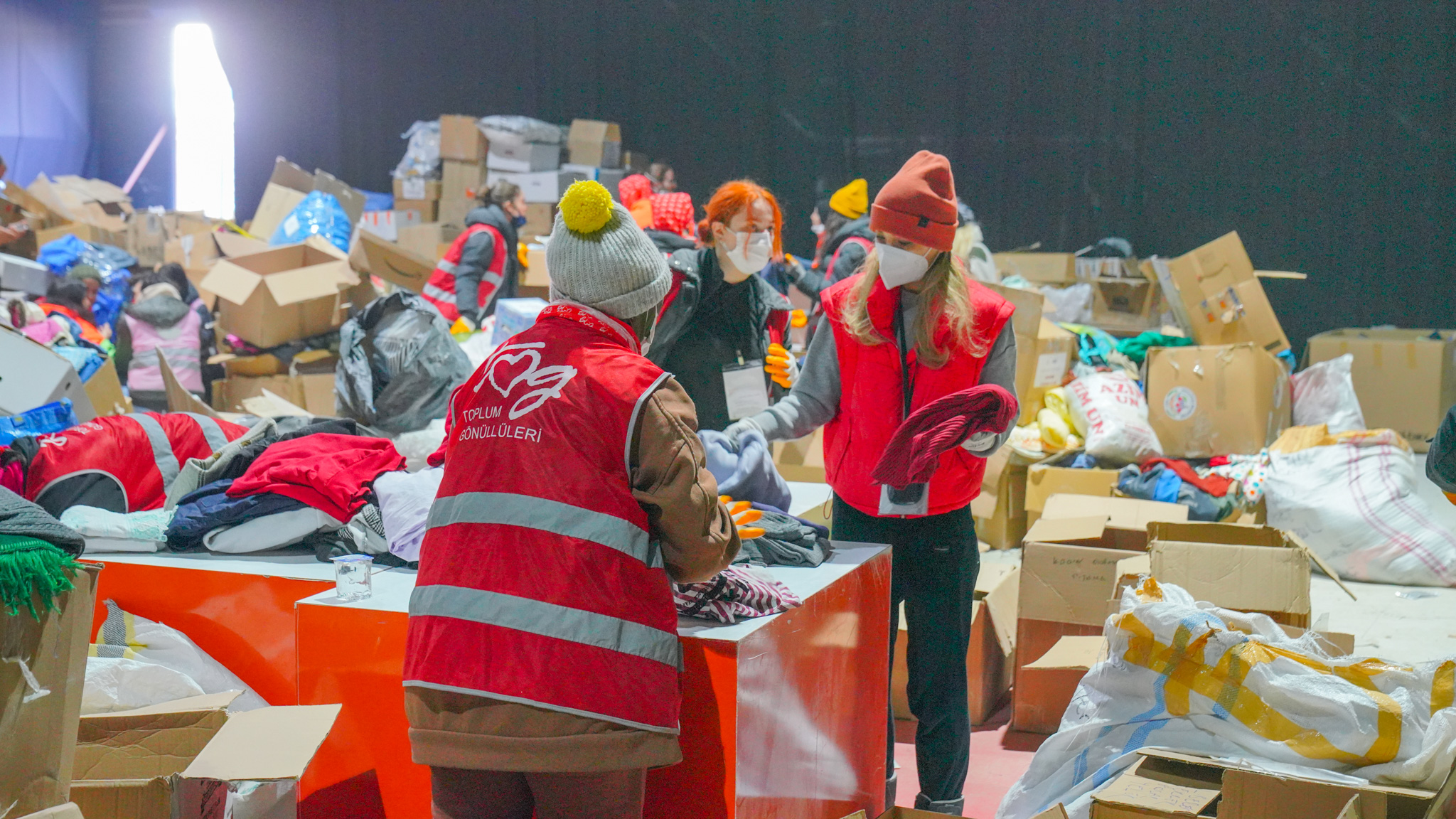Women volunteers play a life-saving role in the earthquake response
Date:

When the earthquakes struck southeastern Türkiye on February 6, the Community Volunteers Foundation immediately deployed its volunteers to the storage units in earthquake zones to classify, store and distribute urgent supplies to the survivors. Women volunteers have played a life-saving role in the response by ensuring that women and girls receive the aid and support they need.
Volunteers play an essential role in disaster response and emergencies, supporting the immediate needs of the survivors, assisting public institutions in delivering services, and aiding survivors who require care and support. After the earthquakes hit 11 provinces in southeast of Türkiye on the 6th of February, thousands of volunteers were deployed in the disaster areas to assist public institutions and help the survivors who lost their homes and loved ones to the devastating earthquakes.
Community Volunteers Foundation (TOG, for its acronym in Turkish), one of UN Women’s civil society partners, has worked tirelessly with its more than 800 volunteers, half of them women, on the ground for the past month.
Just after the earthquakes, people, national and local institutions, civil society organizations and private companies from across the country started to send aid packages, blankets, and food items to the earthquake zones. The huge amount of aid required support from the volunteers.
Coming from all over the country, TOG volunteers, including earthquake survivors, were there to help. In coordination with public authorities, they have been sorting, storing and delivering these items to survivors, including women and girls since day one.
“The variety of humanitarian supplies has been changing every single day. One day, a truckload of hygiene products and sanitary pads comes; the other day there is none of these items. So, our work is very important as focal persons in the storage units to sort, pack, and deliver the immediate needs of the survivors,” says Rana Kara, 27, from Istanbul, who is a training expert at TOG.
After working at one of the storage units in Hatay, Kara explains how the system works: “We classify and store the items, prepare aid packages according to the list of requirements shared by local authorities in the region and send them to tent settlements.”
Zilan Aydın, 23, has been a TOG volunteer for the past five years. She was in her hometown Antalya, when the earthquakes hit and shortly after she deployed to the area. She was assigned to a storage unit in Hatay to coordinate the aids and to set up the operation: “People come to the storage units to pick up the items they need. Often, men come and get these items for their families. Due to gender stereotypes and traditional values, sometimes men don’t know how to ask for sanitary pads, or they ask if their wives and daughters use the same type of sanitary pads. So, we decided to put sanitary pads and diapers into all aid boxes we prepare for families.”
Aydın, also studying dentistry, shares her experiences and observations on the ground: “As a health professional, I see that many pregnant women are saying that they are bleeding, and they have a risk of miscarriage. I also witness that women tend to prioritize the needs of their children first; they want to take diapers and baby formula and put their needs in second place.”
Dilay Duman, 34, has been a TOG volunteer for more than 15 years. She is currently working for a civil society organization in Mersin, a city in the south of Türkiye. Right after the earthquakes, she deployed to her hometown Hatay as a volunteer. She says that it is very challenging to be a volunteer in times of disaster: “During disasters, you need to organize faster, be able to make decisions in a changing environment, and be more careful than ever while taking initiatives. As volunteers, we need to acknowledge the vulnerabilities of people, including women, and we need to be supportive in any case.”
Hazal Günel, Gender Equality Programs Specialist at TOG, says that women volunteers play a life-saving role in the earthquake response: “Women volunteers can ensure that different needs and priorities of women and girls are met. Their presence provides a gender lens at all levels of the humanitarian response. This is why we especially deployed women volunteers. We believe that women volunteers make a valuable contribution to assisting women experiencing difficulties in the earthquake zones.”
Günel says that their volunteers are assigned to seven different storage units in Hatay, Adıyaman and Kahramanmaraş, the most affected cities by the earthquakes. “Volunteers are deployed to work on the ground for a maximum of 5 days because of their well-being and the risk of secondary trauma. Their mental and physical health is essential for the sustainability of volunteer work on the ground,” she explains.
The Community Volunteers Foundation (TOG) works with youth and encourages them to participate in social responsibility projects as volunteers. The foundation is a partner organization of UN Women and implements a training programme for volunteers within the “Strong Civic Space for Gender Equality”, funded by the European Union.
If you would like to support UN Women’s efforts in the earthquake zone in Türkiye and Syria and help women, girls and their families who are in urgent need, please donate here.